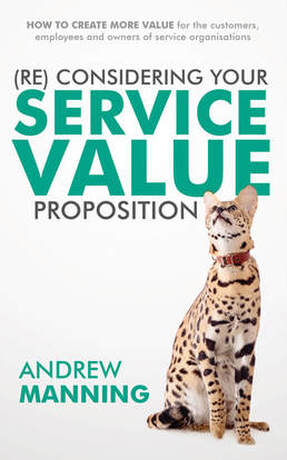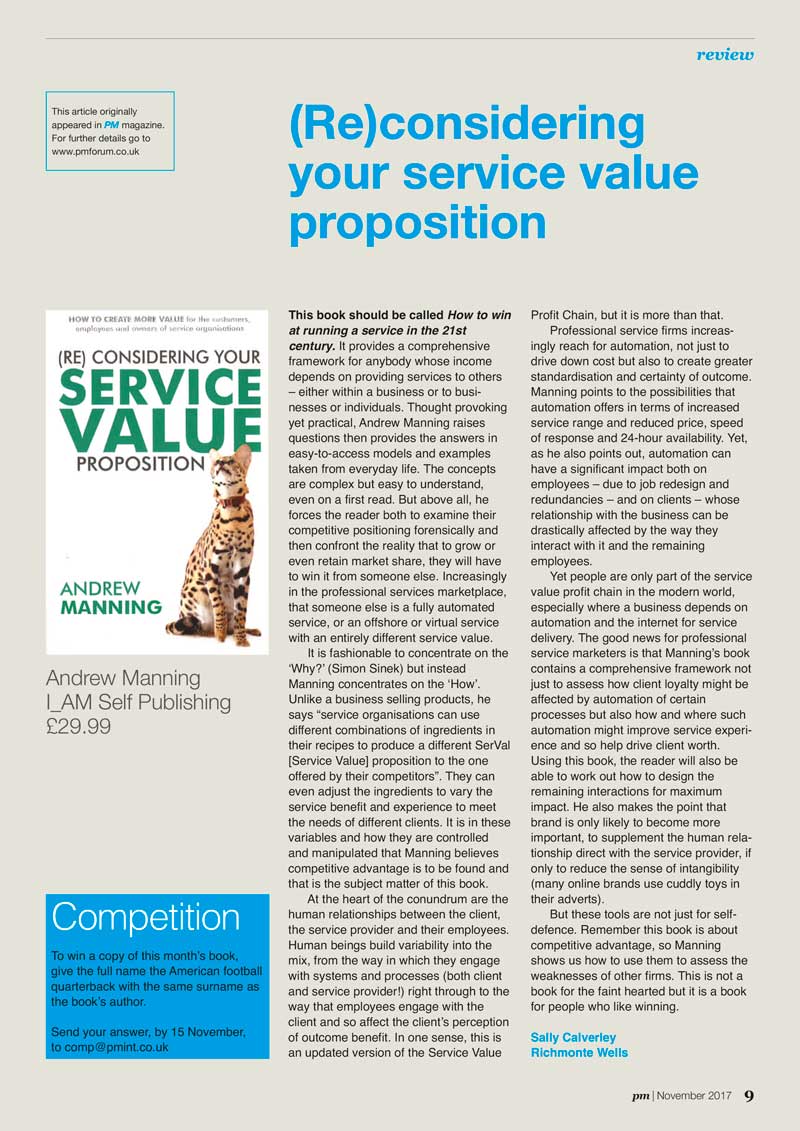(Re) Consider your Service Value proposition:How to create more value for the customers, employees and owners of service organisations
Services form the largest parts of most developed economies, and a growing part of emerging economies too. And all organisations contain in-house service teams and departments. So, this book is relevant to you, whatever, or wherever, your organisation. Why is it important to (re)consider your service offering? Because, the market for services is becoming even more competitive. This may be increased competition for customers, employees, other resources, budgets, profits or capital. Traditional service models are being shaken up by the tech and digital revolution; people are competing with technology, which can either support them or make them redundant. Even the need for real estate is being supplanted by “virtual” premises. Public services are competing for decreasing government expenditure against a background of increased demand and rising service level expectations, and against private sector and third sector alternatives. In-house service teams, such as finance, HR, IT and marketing, are competing with outsourced alternatives, which may be “offshore”. This book provides a practical framework for service organisations to identify, consider, and respond to these challenges, and to avoid the many pitfalls that can exist in doing so. |
Buy the book |
Who should read the book?
You should read this book if you lead, manage, work at, work with, invest in, are advising, or want to start, a service organisation. It should be of use to general managers, functional specialists, change specialists, investors, lenders, consultants, educators, and students. It should also be of assistance to all those politicians and civil servants who are faced with making decisions about public services.
You don’t have to be a genius or a visionary or even a college graduate to be a success. You just need a framework and a dream.
Michael Dell
Is yours a service organisation?
|
According to the European Central Bank, services in 2014 (including non-marketed services, such as those provided by the Government*) comprised 73.9% of the economy in the Euro area, 80.4% in the US, 74.3% in Japan, and 48.2% in China. These areas generate 49.1 % of the world’s GDP.
* Organisations that provide public services, such as health, welfare, education, utilities and defence can represent over 40% of GDP in some Western economies. Furthermore, if you think this book isn’t for you because your organisation is either a manufacturer or producer of raw materials, or a technology business, etc, then consider the following:
So, some part of your organisation is almost certainly a service provider, and therefore this book is for you too! |
I read with great interest and enthusiasm your book and found it very fascinating. It relies on your huge experience and should be a top priority in the reading list of anybody dealing with service business. You have a superb pedagogical talent and a amazing way of keeping the attention of the reader. When I started reading your book, I could hardly stop. Clearly demonstrates the importance of the service experience. |
Why should you read this book
|
We are in the most competitive economic environment for many years and this, along with technological innovation, has created the most competitive environment for services in decades.
This can be competition for customers, for employees, for other resources, for budgets, for finance and/or competition for profits. As an in-house team, you may be competing with an outsourcing alternative or an offshoring alternative. As a public service provider, you may be competing with other public services for a share of government expenditure, and/or against the private sector or Third Sector alternatives. As an individual or a team, you may be competing with the internet or other technology that can replace people. As an individual, you may be competing to get promoted or retain your job, or for more attention from your peers and superiors. If you are a student, your aim is to pass exams. If you are an adviser, it is to provide the best advice. If you are an investor, then you will want to better understand the service organisations you are investing in and spot opportunities before others do. If you are a politician and/or a civil servant, you will be seeking ways to provide public services that are affordable, fit for purpose, and of sufficient quality that voters will support you. |
Anyone with an interest in running a service business will benefit a LOT from reading the book. Andrew has created a “playbook” for a service organization. Interesting and comprehensive. A broad coverage of the basics of creating service value. |
Do service organisations have enough in common to permit analysis?But you may ask, if services do represent such a broad range of activities, do they really have enough in common to identify some common learning points?
My experience of both working with and studying all sorts of service businesses, and as a consumer of all sorts of service, strongly suggests that they do. Moreover, I will demonstrate that gaining an effective understanding of these common points is fundamental if we are to meet customer, employee, and shareholder/owner expectations, and to achieve a competitive advantage. |
All of us engaged in providing a service would do well to read this book. It is particularly important in that it stays highly focused on the customer as well as the other stakeholders. It also takes our current thinking about services to a new and higher level. In introducing the concept of ServVAL which Andrew clearly defines and explains he makes the reader realise just how multifaceted adding value in the context of services is. It is a book that all of us should a keep accessible as it also serves as a very good reference book. |
How will you benefit from reading this book
The book will help you to think about these three questions in a structured, informative manner. To achieve this, it is designed to provide you with:
By sharing this book with your colleagues, you can create a common level of understanding upon which to build a better service organisation that is more able to survive and thrive. In addition, by providing you with a greater insight into service organisations, it should help you to both protect and advance your own career. This book provides a framework to understand and improve service organisations. It doesn’t provide a dream. |
Thank you – I found your exposition of VPs the clearest and most practically useful I’ve ever heard. Thanks for your briefing session – which I found really interesting! Andrew, I just got back from a 2-week trip and saw that I had received your book on service value. I have only looked at it briefly, but you have packed an amazing amount of info in it. |
Will you think differently or more about service after reading this book?This book is designed to provoke thinking, as it is a book of questions and a few answers. You may not agree with some or most of it, or the framework on which it is based. That doesn’t matter to me, and shouldn’t to you if it succeeds in sparking additional understanding and thinking that will help you to see your service organisation more clearly.
Without asking the right questions, you won’t find the right answers for your service organisation. And the right answers for each service organisation are different: you will be serving different types of customers with different services in different localities. Furthermore, you will be competing with other service providers and if your answers are the same as theirs, you will have no competitive advantage, and so surviving and thriving will be that much harder. It’s not what you look at that matters, it is what you see. This book aims to help you see.
|





